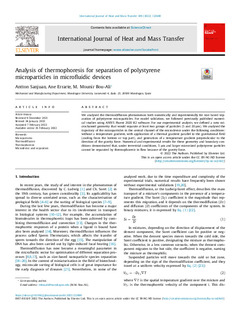| dc.rights.license | Attribution-NonCommercial-NoDerivatives 4.0 International | * |
| dc.contributor.author | Sanjuan, Antton | |
| dc.contributor.author | Errarte, Ane | |
| dc.contributor.author | Bou-Ali, M. Mounir | |
| dc.date.accessioned | 2023-03-02T11:51:53Z | |
| dc.date.available | 2023-03-02T11:51:53Z | |
| dc.date.issued | 2022 | |
| dc.identifier.issn | 0017-9310 | en |
| dc.identifier.other | https://katalogoa.mondragon.edu/janium-bin/janium_login_opac.pl?find&ficha_no=167821 | en |
| dc.identifier.uri | https://hdl.handle.net/20.500.11984/6028 | |
| dc.description.abstract | We analysed the thermodiffusion phenomenon both numerically and experimentally for size-based separation of polystyrene microparticles. For model validation, we followed previously published numerical studies using ANSYS Fluent 2020 R2 software. For our experimental analysis, we defined a new microchannel geometry that would separate at least two groups of particles (5 and 20 µm). We analysed the trajectory of the microparticles in the central channel of the microdevice under the following conditions: without a temperature gradient, with application of a thermal gradient parallel to the gravitational field (cooling from the bottom or top part), and generation of a temperature gradient perpendicular to the direction of the gravity force. Numerical and experimental results for these geometry and boundary conditions demonstrated that, under terrestrial conditions, 5 µm and larger microsized polystyrene particles cannot be separated by thermophoresis in flow because of the gravity force. | en |
| dc.description.sponsorship | Gobierno Vasco-Eusko Jaurlaritza | es |
| dc.language.iso | eng | en |
| dc.publisher | Elsevier | en |
| dc.rights | © 2022 The Authors | en |
| dc.rights.uri | http://creativecommons.org/licenses/by-nc-nd/4.0/ | * |
| dc.subject | Microparticles | en |
| dc.subject | Thermodiffusion | en |
| dc.subject | Thermophoresis | en |
| dc.subject | Microdevice and separation | en |
| dc.title | Analysis of thermophoresis for separation of polystyrene microparticles in microfluidic devices | en |
| dc.type | http://purl.org/coar/resource_type/c_6501 | |
| dcterms.accessRights | http://purl.org/coar/access_right/c_abf2 | en |
| dcterms.source | International Journal of Heat and Mass Transfer | en |
| local.contributor.group | Mecánica de fluidos | es |
| local.description.peerreviewed | true | en |
| local.identifier.doi | https://doi.org/10.1016/j.ijheatmasstransfer.2022.122690 | en |
| local.relation.projectID | info:eu-repo/grantAgreement/GV/Elkartek 2021/KK-2021-00082/CAPV/Microtecnologías como motor de desarrollo de Microsistemas avanzados integrados en la Fábrica Inteligente y Digital en el marco de la IIoT4.0/μ4IIOT | en |
| local.relation.projectID | info:eu-repo/grantAgreement/GV/Ikertalde Convocatoria 2022-2025/IT1505-22/CAPV/Mecánica de fluidos/ | en |
| local.relation.projectID | info:eu-repo/grantAgreement/GV/PRE-2019–1–0202 | en |
| local.relation.projectID | info:eu-repo/grantAgreement/GE/Programa Estatal de Generación de Conocimiento y Fortalecimiento Científico y Tecnológico del Sistema de I+D+i y del Programa Estatal de I+D+i Orientada a los Retos de la Sociedad/PID2020-115086GB-C33/ES// | en |
| local.rights.publicationfee | APC | en |
| local.rights.publicationfeeamount | Acuerdo transformativo Elsevier | en |
| local.source.details | Vol. 189. Article 122690 | en |
| oaire.format.mimetype | application/pdf | |
| oaire.file | $DSPACE\assetstore | |
| oaire.resourceType | http://purl.org/coar/resource_type/c_6501 | en |
| oaire.version | http://purl.org/coar/version/c_970fb48d4fbd8a85 | en |








